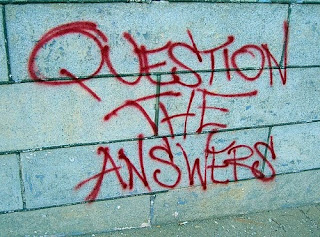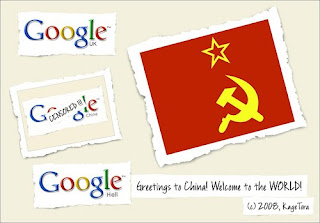Malaysia's encounter with radical Islam has not been altogether unpredictable. It has been brewing for many years.
First the overtly Islamist political party PAS established itself as a mainstream political party. Subsequently, the parameters of social debate shifted. The discussion is no longer secular versus Shariah or freedom of choice versus Islamic. It is now a question of defining 'Islamic' behaviour.
Practically speaking, the legal niceties may not matter soon. Islam will be delineated by goons through violence and the threat of violence.
Several years ago I visited Kuala Lumpur (KL) regularly during Ramadan. It never occurred to me that I may get in trouble for (discreetly) eating during the holy month.
KL is not Malaysia. KL represents modern, liberal and cosmopolitan Malaysia. A Malaysia where I can sip a cocktail at an outdoor cafe while listening to the Muezzin's call to prayer.
Ironically, in today's environment I prefer covering my Allah pendant while eating in a Chinese restaurant lest some fanatic lecture me for eating non-halal food.
Visit KL during Ramadan in 2010? Unlikely. I don't need to prove a point to anyone. Nor do I wish to (possibly) waste my time explaining the concept of Free Will to the religious police. Especially not while locked up in a cell.
The social cleavages did not appear just yesterday. Generally when churches are vandalized or pig heads find their way into mosque courtyards, they are the result of years of pressures hitting boiling point.
The trend started with a few provinces tightening up on Islamic laws such as female dress codes. Laws on alcohol and khalwat were brushed up and implemented. A general air of religiosity, as defined by the Islamist ruling party, descended onto the areas.
Once political Islam is bandied about then it is virtually impossible to control. Islam takes on a political life of its own. (I am not sure Frankenstein is an apt comparison in the circumstances?)
Ask UMNO, Malaysia's ruling party. Wishing to pander to the Islamic constituency, the authorities began raiding hotels and arresting Muslims for drinking alcohol and male-female proximity. UMNO opposed the use of the word Allah by non-Muslims. Oddly enough Malaysia's Islamic party, PAS, has issued statements saying it is acceptable for non-Muslims to use Allah to describe God.
I have not painted an optimistic picture of Malaysia's future. But I have not given you all the facts. Malaysian civil society is gearing up for a long slog against radical Islam's onslaught.
The courts have not disappointed. It was a court decision granting Catholics the right to use Allah during sermons which ignited the Allah controversy. Today, the KL High Court overturned a government ban on a controversial book, "Muslim Women and the Challenge of Islamic Extremism." The book is published by a Malaysian women's advocacy group named Sisters in Islam.
I fear for Malaysia. Sadly, I have seen this script performed before. In many ways, Malaysia's scenario is an 'instant replay' of Pakistan during the last two decades.
Civil society tends not to be forceful enough to resist the aggressive offensives undertaken by militant Islam. It is difficult for ordinary Muslims to stand up and say, "Mr. Mullah, that's not the Islam I know. You are wrong." The stigma of being branded 'anti-Islam' is real.
Most average Muslims neither have the desire nor the courage to complicate their lives by opposing extremist ideas. It may be passive complacency or simply a wish to get on with a normal life. Either way, the broad social inertia helps militant ideas take root.
If there is ever a time for the Malaysian government to lead from the front, it is today. While invoking the Internal Security Act to clamp down hard on troublemakers attacking churches and mosques may be extreme, the government must send a clear message to extremists that it means business. Delay only emboldens them.
As Islamist pressures increase in Malaysia the atmosphere for Singaporean Malays (read Muslims) changes. How will Singapore react if the Singaporean Malay community demands similar concessions, e.g. no alcohol for Muslims, no serving of food for Muslims during Ramadan, no Muslims permitted to enter casinos, or enforcing the tudung (scarf head covering) as mandatory for women?
Many will scoff at my suggestions believing they are impossible in Singapore. My friends used to say the same thing about Malaysia a decade ago. "Malaysian Islam is different and there are too many Chinese in Malaysia." Many Singaporeans also believed that local Muslims were somehow immune to radicalization. Remember Mas Selamat and the Singapore cells of Jemaah Islamiah?
Some of us remember when the streets of Teheran and Kabul were filled with mini-skirts; When Kabul's buses were often driven by women or when Karachi's nightclubs were famous for Lebanese and Syrian cabaret dancers.
Will I one day be writing about KL's nightclubs in past tense?
Historically, Islam has often existed with parallel legal systems: the Millet system. Malaysia's dual tracked system is evolving naturally. Singapore's is already partially in place, i.e. the Administration of Muslim Law Act (AMLA).
AMLA is a parallel legal framework based on a combination of Malay and Islamic traditions. Under Singapore law, the Islamic Religious Council of Singapore (MUIS) is empowered to advise the President on all matters pertaining to Malays (read Muslims).
I just hope the Singapore President remembers that Muslims, Malay or not, have civil rights too. Even if those rights do not include writing a Will they certainly include the right to sin at our own discretion.

















+church+in+Aleppo+Syria+is+considered+to+be+one+of+the+oldest+remaining+churches+in+the+world..jpg)





.jpg)















